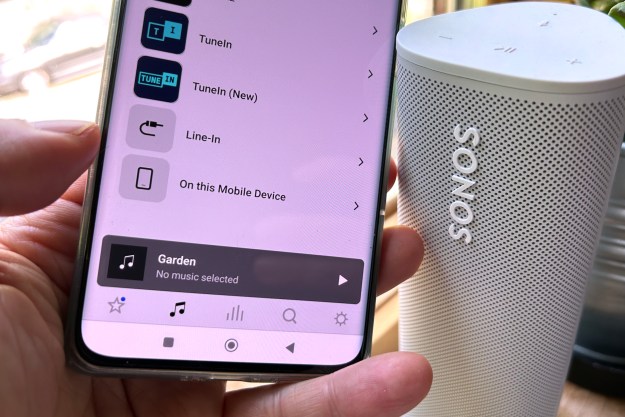Sonos made quite a splash in January when it sued Google for allegedly stealing its intellectual property. Now, Google is returning the favor.
The tech giant has countersued Sonos, alleging that the whole-house audio company infringed on five different Google patents. These patents include mesh networking, echo cancellation, DRM, content notifications, and personalized search.
In its initial lawsuit, Sonos claimed that during the time it had been partnered with Google to bring Google Play Music and Google Assistant to the platform, Google allegedly gathered knowledge about Sonos’ wireless audio system that it then used to create its own line of multiroom speakers.
Google does sell several smart wireless speakers, including the Google Nest Mini, Google Home, and Google Home Max, but Google disputed the claims at the time and told Digital Trends that it “will defend them vigorously.”
Enter Google’s countersuit. In a statement to Digital Trends, Google spokesperson Jose Castaneda said that the company is “disappointed that Sonos has made false claims about our work together and technology.”
“We are reluctantly defending ourselves by asserting our patent rights,” Castaneda said. “While we look to resolve our dispute, we will continue to ensure our shared customers have the best experience using our products.”
Google traditionally has shied away from filing lawsuits in the past. For it to take this kind of legal action, especially against a partner like Sonos, is somewhat unprecedented. But according to portions of the complaint shared with Digital Trends, Google believes there’s merit in taking these steps.
“Google is proud of its more than five-year partnership with Sonos and has worked constructively with
“Sonos is actively infringing Google’s intellectual property.
Sonos issued this response from
“Instead of simply addressing the merits of our case, and paying us what we’re owed, Google has chosen to use their size and breadth to try and find areas in which they can retaliate. We look forward to winning our original case, and this newly filed case as well.
“As we saw in the past with Eero, and have seen most recently with Zoom, Google seems to have no shame in copying the innovations of smaller American companies in their attempts to extend their search and advertising monopolies into new categories.
“We’re mostly sad to see a once-innovative company with the mission of “Do No Evil” avoid addressing the fact they’ve infringed on our inventions, and have turned to strong-arm tactics the robber barons of old would have applauded.”
It doesn’t seem like this dispute will have a quick resolution, but the outcome could get messy. If Sonos and Google break their partnership because of these suits, Google’s voice and music services could realistically leave the
Sonos would still have a solid catalog of other music streaming services without Google Play Music, and Amazon Alexa voice support would remain in the absence of Google Assistant. Essentially, it is highly likely that
Editors' Recommendations
- Faster to use, but missing many features, the new Sonos app is a work in progress
- Wait! Don’t update your Sonos app until you read this
- 11 Sonos tips, tricks, and little-known features
- Google says the Pixel Buds Pro/Pixel 8 phone combo is better for calls — it’s not that simple
- Google TV gives NFL Sunday Ticket top billing, adds FAST channels



